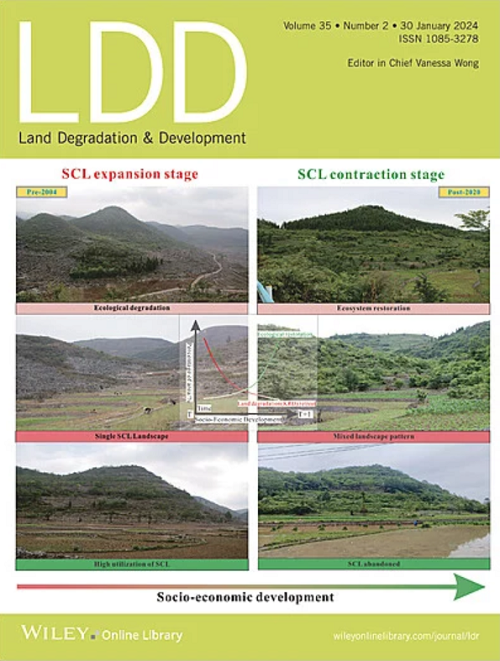Do Land Resources, Agriculture Exports, and Agriculture Growth Induce Agriculture-Related Greenhouse Gas Emissions: Novel Findings in the Lens of COP–28
IF 3.6
2区 农林科学
Q2 ENVIRONMENTAL SCIENCES
引用次数: 0
Abstract
Globally, economies are highly concerned about the balance between climatic issues and attaining agricultural sustainability. However, empirical evidence regarding the nexus of agricultural sustainability, emissions, land use, and agricultural trade is scarce and requires appropriate policy-level attention. The current study examines the influence of land-use resources, agricultural exports, and foreign direct investment on agriculture-related greenhouse gas emissions in Brazil. Using various time series diagnostic measures on quarterly data from 1990Q1 to 2020Q4 reveals non-normality and a mixed order of stationarity in variables. The autoregressive distributed lag (ARDL) model and quantile ARDL approach are employed for comprehensive empirical analysis. The results assert that land resources and foreign investments are harmful to environmental sustainability, as they significantly enhance agricultural greenhouse gas emissions. Additionally, agricultural exports and green energy significantly contribute to emissions mitigation by tackling land-use and agricultural emissions in the short and long run. The results are robust across the ARDL and quantile regressions and pairwise granger causality. The study concludes that agricultural exports and land use are key factors inducing agricultural sustainability by inducing emissions. The study recommends increased spending on research and development, solar-based irrigation, and promotion of green energy projects. The study discusses novel findings and implications apropos land resources, foreign investments, agricultural exports, and emissions in the lens of COP 28.土地资源、农业出口和农业增长是否会导致农业相关的温室气体排放:COP-28镜头下的新发现
在全球范围内,各经济体高度关注气候问题与实现农业可持续性之间的平衡。然而,关于农业可持续性、排放、土地利用和农业贸易之间关系的经验证据很少,需要适当的政策层面的关注。本研究考察了巴西土地利用资源、农业出口和外国直接投资对农业相关温室气体排放的影响。对1990Q1 - 2020Q4季度数据使用各种时间序列诊断方法,发现变量的非正态性和平稳性的混合顺序。采用自回归分布滞后(ARDL)模型和分位数ARDL方法进行综合实证分析。结果表明,土地资源和外国投资对环境可持续性有害,因为它们显著增加了农业温室气体的排放。此外,农产品出口和绿色能源通过解决短期和长期的土地利用和农业排放问题,大大有助于减少排放。结果在ARDL和分位数回归以及两两格兰杰因果关系中都是稳健的。研究认为,农业出口和土地利用是通过诱导排放诱导农业可持续发展的关键因素。该研究建议增加在研发、太阳能灌溉和推广绿色能源项目上的支出。该研究讨论了在cop28框架下有关土地资源、外国投资、农业出口和排放的新发现和影响。
本文章由计算机程序翻译,如有差异,请以英文原文为准。
求助全文
约1分钟内获得全文
求助全文
来源期刊

Land Degradation & Development
农林科学-环境科学
CiteScore
7.70
自引率
8.50%
发文量
379
审稿时长
5.5 months
期刊介绍:
Land Degradation & Development is an international journal which seeks to promote rational study of the recognition, monitoring, control and rehabilitation of degradation in terrestrial environments. The journal focuses on:
- what land degradation is;
- what causes land degradation;
- the impacts of land degradation
- the scale of land degradation;
- the history, current status or future trends of land degradation;
- avoidance, mitigation and control of land degradation;
- remedial actions to rehabilitate or restore degraded land;
- sustainable land management.
 求助内容:
求助内容: 应助结果提醒方式:
应助结果提醒方式:


